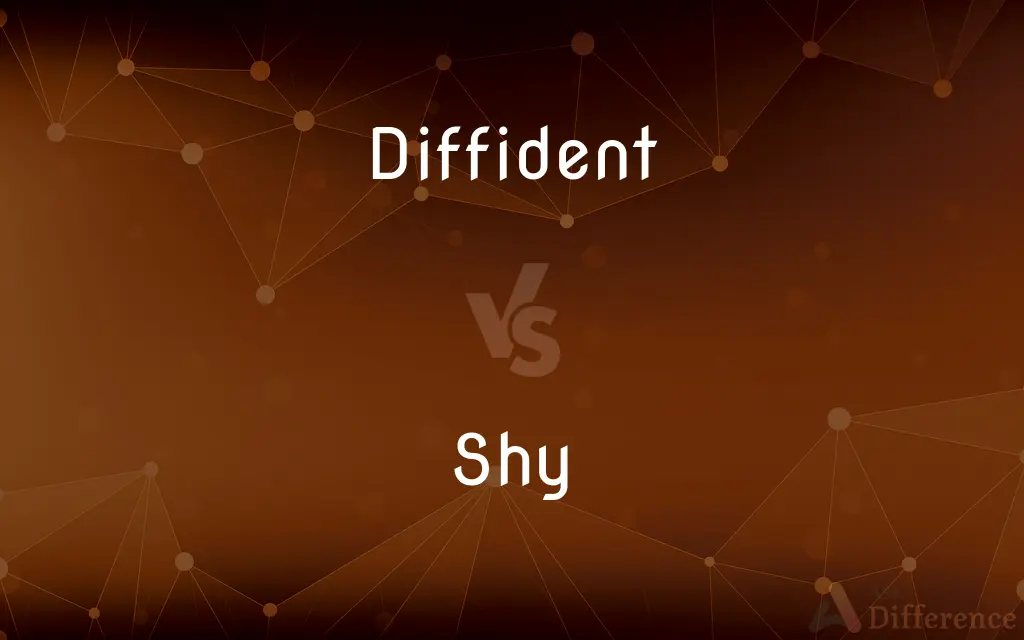Diffident vs. Shy — What's the Difference?
By Tayyaba Rehman & Maham Liaqat — Updated on April 25, 2024
Diffident individuals often lack self-confidence in their abilities, while shy people experience discomfort or nervousness in social situations.

Difference Between Diffident and Shy
Table of Contents
ADVERTISEMENT
Key Differences
Diffident individuals typically doubt their capabilities or feel unworthy of attention, whereas shy people might avoid social interactions due to a fear of being judged or discomfort in crowds.
In professional settings, diffident employees may hesitate to voice opinions, feeling unqualified, while shy employees might struggle with public speaking or networking, due to social anxiety.
Diffidence often stems from a lack of self-esteem, impacting decision-making, whereas shyness primarily affects how one interacts in social environments.
During social events, diffident people might not engage much because they underestimate their conversational skills, while shy individuals might simply feel overwhelmed or anxious about the interaction.
Education and therapy can help diffident individuals build self-confidence, while shy individuals may benefit from gradual exposure to social situations to overcome their fears.
ADVERTISEMENT
Comparison Chart
Focus
Self-perception of competence
Discomfort in social settings
Professional Impact
Hesitance in expressing views
Difficulty in networking
Origin
Low self-esteem
Social anxiety
Social Interaction
Underestimates own value
Feels overwhelmed
Remedial Approaches
Building self-esteem
Social exposure therapy
Compare with Definitions
Diffident
Lacking confidence in one's own ability.
He was too diffident to pursue the lead role in the play.
Shy
Reluctant to draw attention.
He gave a shy nod in response to the compliment.
Diffident
Showing restraint or reserve.
His diffident smile did little to reveal his true feelings.
Shy
Lacking comfort in new or public surroundings.
The shy child hid behind his mother's legs.
Diffident
Hesitant in acting or speaking through lack of self-confidence.
She was diffident about stating her opinion during the meeting.
Shy
Easily frightened away.
The shy deer bolted as soon as we stepped into the clearing.
Diffident
Modest or shy because of a lack of self-confidence.
His diffident approach often caused him to fade into the background.
Shy
Reserved or having an aversion to social interaction.
She felt shy at parties and often clung to her close friends.
Diffident
Not assertive.
Despite her expertise, she was diffident in the boardroom.
Shy
Nervous or timid in the company of others.
Her shy demeanor made it difficult to make new friends.
Diffident
Modest or shy because of a lack of self-confidence
A diffident youth
Shy
Nervous or timid in the company of other people
I was pretty shy at school
A shy smile
Diffident
Lacking or marked by a lack of self-confidence; shy and timid
He was too diffident to express his opinion.
Shy
Less than; short of
The shares are 29p shy of their flotation price
Diffident
(archaic) Lacking confidence in others; distrustful.
Shy
(of a plant) not bearing flowers or fruit well or prolifically.
Diffident
Lacking self-confidence; timid; modest
Shy
(especially of a horse) start suddenly aside in fright at an object, noise, or movement
Their horses shied at the unfamiliar sight
Diffident
Wanting confidence in others; distrustful.
You were always extremely diffident of their success.
Shy
Fling or throw (something) at a target
He tore the spectacles off and shied them at her
Diffident
Wanting confidence in one's self; distrustful of one's own powers; not self-reliant; timid; modest; bashful; characterized by modest reserve.
The diffident maidens,Folding their hands in prayer.
Shy
A sudden startled movement, especially of a frightened horse.
Diffident
Showing modest reserve;
She was diffident when offering a comment on the professor's lecture
Shy
An act of flinging or throwing something at a target.
Diffident
Lacking self-confidence;
Stood in the doorway diffident and abashed
Problems that call for bold not timid responses
A very unsure young man
Shy
Easily startled; timid
A shy deer.
Shy
Tending to avoid contact or familiarity with others; retiring or reserved
A shy student who stayed in the back of the room.
Shy
Characterized by reserve or diffidence
A shy glance.
Shy
Distrustful; wary
Shy of strangers.
Shy
Not having a sufficient or specified amount, as of money
Was shy $100 on his rent.
Was two victories shy of the school record.
Shy
To move suddenly or draw back, as if startled or afraid
The horse shied at the loud sound.
Shy
To avoid engaging in, treating, or discussing something
"a film adaptation that would not shy away from the novel's controversial themes" (Scot French).
Shy
To throw (something) with a swift motion; fling.
Shy
To throw something with a swift motion.
Shy
A sudden movement, as from fright; a start.
Shy
A quick throw; a fling.
Shy
(Informal) A gibe; a sneer.
Shy
(Informal) An attempt; a try.
Shy
Easily frightened; timid.
Shy
Reserved; disinclined to familiar approach.
He is very shy with strangers.
Shy
Cautious; wary; suspicious.
Shy
(informal) Short, insufficient or less than.
By our count your shipment came up two shy of the bill of lading amount.
It is just shy of a mile from here to their house.
Shy
Embarrassed.
Shy
(intransitive) To avoid due to caution, embarrassment or timidness.
I shy away from investment opportunities I don't understand.
Shy
(intransitive) To jump back in fear.
The horse shied away from the rider, which startled him so much he shied away from the horse.
Shy
(transitive) To throw sideways with a jerk; to fling.
To shy a stone
Shy a slipper
Shy
(Scottish) (transitive) or (intransitive) To throw a ball with two hands above the head, especially when it has crossed the side lines in a football (soccer) match. To hit the ball back into play from the sidelines in a shinty match.
Shy
An act of throwing.
Shy
A place for throwing.
Coconut shy
Shy
A sudden start aside, as by a horse.
Shy
In the Eton College wall game, a point scored by lifting the ball against the wall in the calx.
Shy
(Scottish) In soccer, a throw-in from the sidelines, using two hands above the head. In shinty, the act of tossing the ball above the head and hitting it with the shaft of the caman to bring it back into play after it has been hit out of the field.
Shy
Easily frightened; timid; as, a shy bird.
The horses of the army . . . were no longer shy, but would come up to my very feet without starting.
Shy
Reserved; coy; disinclined to familiar approach.
What makes you so shy, my good friend? There's nobody loves you better than I.
The embarrassed look of shy distressAnd maidenly shamefacedness.
Shy
Cautious; wary; suspicious.
I am very shy of using corrosive liquors in the preparation of medicines.
Princes are, by wisdom of state, somewhat shy of thier successors.
Shy
Inadequately supplied; short; lacking; as, the team is shy two players.
Shy
Owing money to the pot; - in cases where an opponent's bet has exceeded a player's available stake or chips, but the player chooses to continue playing the hand before adding the required bet to the pot.
Shy
To start suddenly aside through fright or suspicion; - said especially of horses.
Shy
To throw sidewise with a jerk; to fling; as, to shy a stone; to shy a slipper.
Shy
A sudden start aside, as by a horse.
Shy
A side throw; a throw; a fling.
If Lord Brougham gets a stone in his hand, he must, it seems, have a shy at somebody.
Shy
A quick throw;
He gave the ball a shy to the first baseman
Shy
Start suddenly, as from fight
Shy
Throw quickly
Shy
Lacking self-confidence;
Stood in the doorway diffident and abashed
Problems that call for bold not timid responses
A very unsure young man
Shy
Easily startled or frightened
Shy
Short;
Eleven is one shy of a dozen
Shy
Wary and distrustful; disposed to avoid persons or things;
Shy of strangers
Common Curiosities
Can therapy help overcome diffidence?
Yes, therapy can be very effective in helping individuals overcome diffidence by building self-esteem and confidence.
What is the main emotional trigger for diffident individuals?
Diffidence is primarily triggered by a lack of self-confidence and a feeling of inadequacy.
Can diffidence affect career progression?
Yes, diffidence can hinder career progression by causing individuals to avoid leadership roles or assertive actions.
How does shyness affect one's personal life?
Shyness can limit social interactions and the forming of new relationships, impacting personal life significantly.
Is shyness the same as social anxiety?
No, while they overlap, shyness is generally less severe and not always linked to the intense fear that characterizes social anxiety.
Can shyness be completely cured?
While not always completely curable, shyness can be managed and reduced through various therapies and social practice.
What strategies can help manage diffidence in professional settings?
Strategies such as positive self-talk, professional development, and mentorship can help manage diffidence.
Does diffidence decrease with age?
Diffidence can decrease with age as individuals gain more life experiences and build self-confidence.
Is it common for shy people to avoid public speaking?
Yes, shy individuals often avoid public speaking due to fear of judgment or nervousness in front of crowds.
What are the social implications of being diffident?
Being diffident can lead to missed opportunities and social withdrawal due to underestimating one's worth.
How does one differentiate between being shy and introverted?
Shyness involves fear of social judgment, whereas introversion is a preference for less stimulating environments.
How can one help a shy child become more outgoing?
Encouraging participation in group activities and slowly exposing them to social settings can help shy children become more outgoing.
Can a person be both diffident and shy?
Yes, a person can be both diffident and shy, each affecting their behavior in slightly different ways.
How can employers support diffident employees?
Employers can support diffident employees by providing positive feedback, opportunities for skill development, and a supportive work environment.
What are the common misconceptions about shy people?
Common misconceptions include the belief that shy people are unfriendly or lack opinions.
Share Your Discovery

Previous Comparison
Routine vs. Routinized
Next Comparison
Periwinkle vs. PurpleAuthor Spotlight
Written by
Tayyaba RehmanTayyaba Rehman is a distinguished writer, currently serving as a primary contributor to askdifference.com. As a researcher in semantics and etymology, Tayyaba's passion for the complexity of languages and their distinctions has found a perfect home on the platform. Tayyaba delves into the intricacies of language, distinguishing between commonly confused words and phrases, thereby providing clarity for readers worldwide.
Co-written by
Maham Liaqat













































